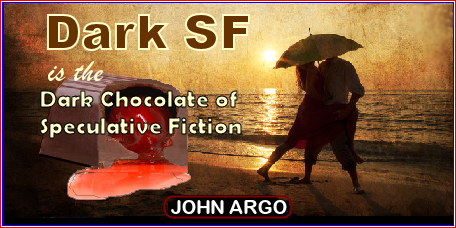|
= John Argo: About DarkSF =

What Is DarkSF? DarkSF is the Dark Chocolate of Science Fiction, Fantasy, and Horror. Read more fascinating info at DarkSF is the Dark Chocolate of SF. These are "original, fresh, and imaginative" creations (from a 2003 Library Journal review to his DarkSF novel Robinson Crusoe 1,000,000 A.D.).
Subversive Fiction (Meanings of SF) SF can be taken to mean Science Fiction, or in the larger framework Speculative Fiction (to embrace the totality of SFFH), or Subversive Fiction (literature of ideas).
More About DarkSF: We like to say that DarkSF is the Dark Chocolate of Science Fiction. DarkSF is not about gore or grue but about art and atmosphere. It is literary and poetic. Think of the artful genius of Ridley Scott's 1979 Alien and 1982 Blade Runner; or Alex Proyas' 1998 Dark City; or Julien Leclercq's 2007 Chrysalis; just to name a few. The best SF is DarkSF because it tends to embrace sweeping themes in a rich broth of art and atmosphere. The list is long, and includes far more of world literature than our Puritanical society is allowed to think. Elements occur in the Epic of Gilgamesh, Homer's Iliad and Odyssey, Vergil's Aeneid, Dante's Divine Comedy, Defoe's 1719 Robinson Crusoe; and tales by many modern masters like Edgar Allan Poe, Philip K. Dick, or Jorge Luis Borges, to name just a few. More info at a special DarkSF subsection (click DarkSF banner below).
 John Argo. On this website, author John T. Cullen—aka John Argo, like the Bronze Age ship of wonder that gave its name to a great constellation in the southern skies—explains his freshly original creations, and speaks of his favorite books and films. You'll gain a deeper understanding of such works as Lantern Road, Day Flies, Meta4City, and many others. The author is developing considerable web real estate for his DarkSF and other series and novels. Once you understand an author, there really is no such thing as a stand-alone; typically, all of an author's works are linked together by a vision larger than any single work. Equally exciting is learning the author's strongly felt inspirations, coming from many great sources like Rod Serling and Ray Bradbury (who sent John T. Cullen a personal fan mail, raving about his holiday fantasy The Christmas Clock. John Argo. On this website, author John T. Cullen—aka John Argo, like the Bronze Age ship of wonder that gave its name to a great constellation in the southern skies—explains his freshly original creations, and speaks of his favorite books and films. You'll gain a deeper understanding of such works as Lantern Road, Day Flies, Meta4City, and many others. The author is developing considerable web real estate for his DarkSF and other series and novels. Once you understand an author, there really is no such thing as a stand-alone; typically, all of an author's works are linked together by a vision larger than any single work. Equally exciting is learning the author's strongly felt inspirations, coming from many great sources like Rod Serling and Ray Bradbury (who sent John T. Cullen a personal fan mail, raving about his holiday fantasy The Christmas Clock.
|

|